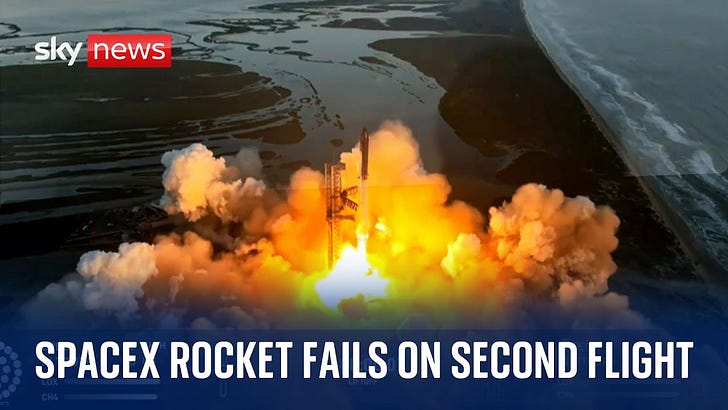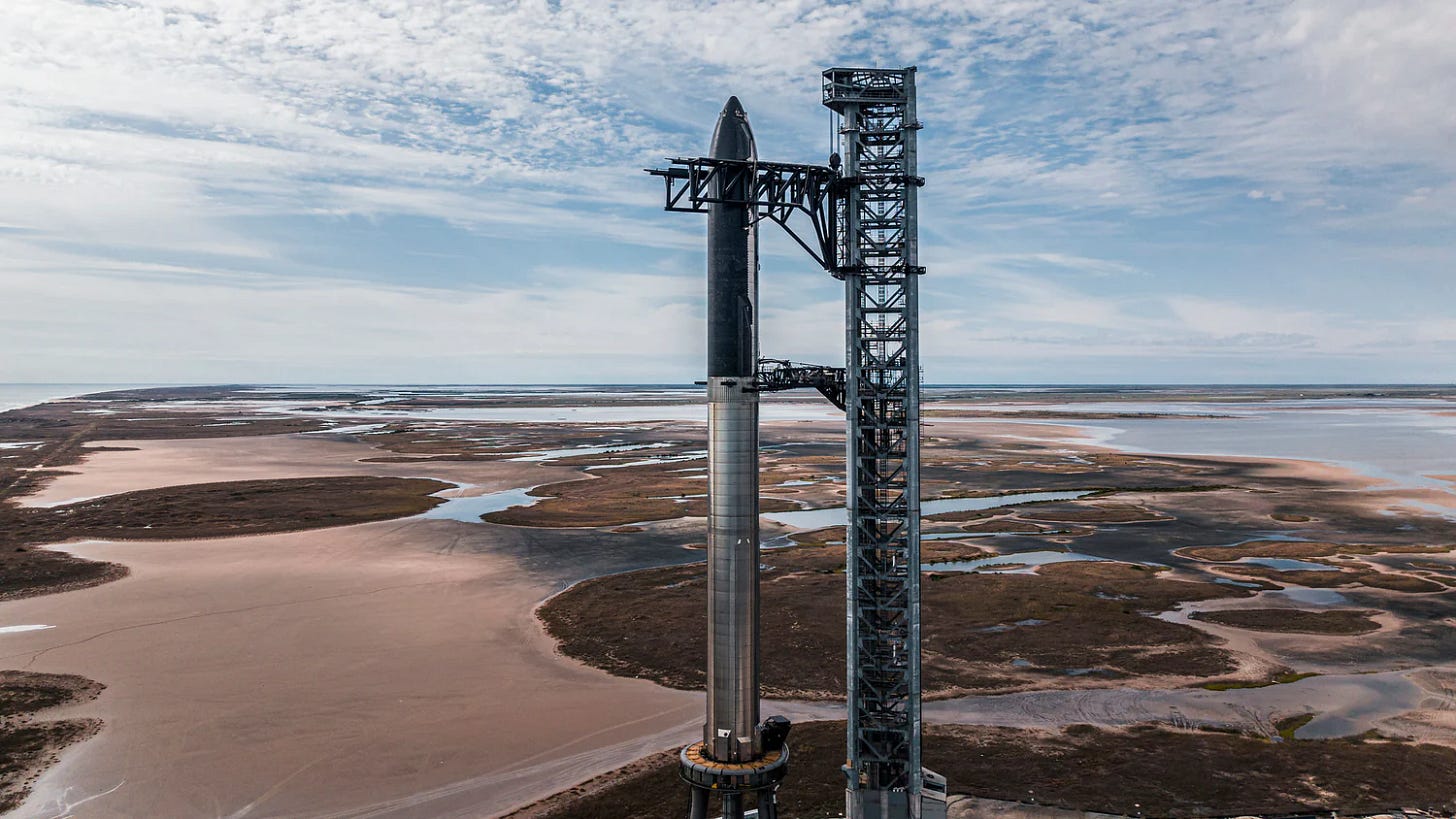I have never bought into the hype and general BS of Elon Musk. His visions for his businesses and the future of humanity and technology, while often engaging, strike me as without basis in reality. There is, in fact, a bit of language that reveals much about Musk and his various endeavors, as if he is letting us in on the multi-billion dollar jokes he is cracking. Whenever one of his SpaceX rockets explodes, he has convinced the public and engineers to refer to it as “a rapid unscheduled disassembly.” Hell, maybe he’s serious.
His semantic talents, though, do nothing to offset his hypocrisies and wanton disregard for concerns that exist outside his spheres of economic interest. Only on Planet Musk does the explosion of history’s largest rocket get billed as a “successful launch,” which happened just days before the Thanksgiving holiday. The Super Heavy rocket, billed as the booster for mankind’s vehicle to take the first trip to Mars, was supposed to fly for 90 minutes but lasted only eight before exploding, uh, sorry, “rapidly disassembling,” 24 miles up. In case you were unaware, this makes for great success, according to SpaceX Quality Engineering Manager Kate Tice.
"Honestly, it's such an incredibly successful day, even though we did have a rapid unscheduled disassembly of both the Super Heavy booster and the Ship," she said. "We got so much data, and that will all help us to improve for our next flight."
SpaceX and Musk appear to have become quite capable at ignoring data that does not comport with their vision. When his launch pad project was pitched to Brownsville residents and the state of Texas, which was to seek approval of millions in tax credits, crowds of 20-30,000 visitors were predicted to provide a huge economic impact in one of America’s most disadvantaged communities. Instead, campgrounds and restaurants get increased customer traffic from self-described “space nerds” by the dozens while endangered species habitats are leveled, and nearby homes and businesses are put at risk by the attendant sound and fury of rocket blasts.
A Typical Rapid Unscheduled Disassembly
Prior to the initial rapid unscheduled disassembly, various organizations were trying to stop what they knew were to be the negative results. Twenty eight community activist groups went on record to oppose continued development of the Boca Chica Beach launch site and any further rocket launches. Carrizo Comecrudo Tribal Chairman, Juan B. Mancias, was incensed his people were not consulted about Musk’s use of sacred lands along the South Texas coast.
“Whenever Elon Musk and his accomplices, the Cameron County Commissioners and Texas General Land Office, close Boca Chica beach for his pet project SpaceX, they destroy our native life ways,” he wrote in a prepared statement. “We, the Carrizo Comecrudo Tribe of Texas, oppose SpaceX operations destroying our sacred lands. The Tribe was never consulted by any of these companies or electeds (sic) about rockets, like County Judge Treviño, who never responded to our request for a meeting.”
The majority of Brownsville’s community leaders clearly have fallen for Musk’s notion that their poor little border town can be transformed by the economic engines of SpaceX. Originally, they even believed the first humans to reach Mars might leave the Earth from a sandy strip of beach on the north side of their town, an outcome as unlikely as Brownsville turning into a borderland Las Vegas. Whatever the current economic impact, Musk is not likely to use his space port on the Gulf Coast as more than a test site. Any manned mission will almost certainly originate from Cape Canaveral, and if the “rapid unscheduled disassemblies” continue apace, chimpanzees, used in the early NASA launches, might even decline the Musk Mars assignment.
Let’s stipulate, though, that space travel is a worthy endeavor. A drive to explore is in our human DNA. The mechanics and biology of getting to Mars, though, are much further into the future than Musk envisions. If he ever gets his booster rocket to escape velocity without exploding, there are still the issues of sustaining human life for the long flight to the red planet. At an initial speed of just under 25,000 mph, the flight to Mars will be seven months in duration. Can the spacecraft carry enough compressed oxygen for a crew of four? What will be habitation on the planet’s surface? Perhaps robots are sent in advance to build a module for living with a method for creating water and oxygen? How much food and water can be transported?
The bigger question, though, is whether we are supposed to trust a private entrepreneur with controversial beliefs and a distrust of the government with which he is doing business? Musk slapped a label of “government funded media” on National Public Radio’s Tweet stream, even though it gets less than one percent of its $390 million dollars from federal funding. NPR subsequently abandoned his platform. No mention has ever been made by the rocket man that SpaceX has been the recipient of more than $15 billion dollars from the federal government in the past twenty years. Tesla has also thrived with tax money, which, according to the Tesla Subsidy Tracker, amounts to a total of $466 million state and federal dollars, and about $64 million of that amount comes from Texas taxpayers. While he complains of bureaucracy and permits slowing down his rocket launches and his driverless car approvals, Musk holds out his hand for an endless flow of taxpayer money.
His problems of the terrestrial variety are many and manifest, especially in Brownsville. The second launch of the Starship heavy lifter also prompted a news release from an association of activist groups that said the blast off from Boca Chica Beach rained down debris on their low income community, destroyed 60 acres of a protected wildlife refuge, cut off fishing and beach access to locals, and threatened lands viewed as sacred by original peoples to region. The central issue of complaints against SpaceX and Musk has been the government’s failure to fully consider the environmental impacts of the launch program of his leviathan rocket ship.
“Musk and his pet vanity project continue to pollute and destroy our beautiful beach, coastline, and wildlife,” said Christopher Basaldú with South Texas Environmental Justice Network. “SpaceX, an unnecessary, private money grab that only serves the wealthy, refuses to follow safety regulations, environmental regulations, and the wishes of local communities and the original people of the land,”
Boca Chica Launch Site
A number of environmental groups, including the Center for Biological Diversity, sued SpaceX after its first disastrous launch of the Falcon Heavy rocket in April. The suit asked for the company’s five year license from the FAA to be revoked. The agency was investigating the first crash at the time the legal action was taken, and is presently investigating the latest sky fall while Musk makes plans for another hurried launch. He needs, of course, more data. According to the U.S. Fish and Wildlife Service, the first launch caused large concrete chunks, stainless steel sheets, metal and other objects to be hurled thousands of feet from the pad and that a plume of pulverized concrete sent material up to 6.4 miles northwest of the Boca Chica Beach space port. Is that useful data?
Skepticism also continues to grow around the environmental logic of electric cars. As sales slow down for the Tesla, and other models, discussion increases about the ecological damage caused by mining rare earth materials like lithium to create batteries. As more and more EVs plug into the grid, a greater demand is also placed on generative capacities of power plants, which tend to rely on fossil fuels of coal and natural gas. Instead of reducing reliance on oil and gas, there exists a likelihood of increased demand unless alternative and renewable sources proliferate accordingly, and increase output. Ford Motor Company is also an example of faltering markets for EVs. The company is postponing a $12 billion dollar investment in electric vehicles after losing $3 billion in production during the first quarter of this year. The Lightning F-150 electric pickups were losing $32,000 per unit for the company.
Musk has other issues more confounding than just market demand for EVs. Rabidly anti-union, his Tesla is confronting a strike in Sweden that has not just shut down its nine repair facilities, but has made it impossible to even get license plates. A union for 300,000 auto workers has forced a halt in operations because Musk has ordered the plant’s management to not sign a collective bargaining agreement. Sympathy strikes by postal workers have also made it impossible for Teslas to get their plates while longshoreman’s unions are also refusing to handle shipments of the vehicles into the country. The strike against Tesla repair shops involves only 130 workers but threatens to spread throughout Scandinavia. On his platform X, Musk posted a simple statement, “This is insane.”
Insanity, he has proved, has multiple forms. One might be using your multi-billion dollar social media platform to enable anti-semitic sentiments. According to an analysis by Media Matters, the X algorithm has positioned top American business brands adjacent to anti-semitic postings, which has led to numerous big name companies cancelling or pausing advertising on the platform. (An example below.)
Musk denied the reporting and filed a lawsuit against the media watchdog organization, which was immediately and widely panned as meritless under provisions of the First Amendment. Unfortunately, any arguments he might have had that neither he nor his platform expressed prejudices was lost when he endorsed a poster’s insistence of the existence of a Jewish scheme to replace Whites with minorities by allowing open borders and easy immigration. Musk responded with, “You have said the actual truth.”
His behavior as owner and CEO of X has driven its value down from a purchase price of $44 billion to $19 billion, and losing a bunch of major advertisers because of a public admission of prejudices is not going to increase his product’s value. Musk might be the richest man on the planet, but there are often days where he appears to have more idiosyncrasies and problems than he does dollars.







I've always wondered where EV users think the power used to charge their battery comes from. Your right, coal and natural gas. To me atomic energy seems the best answer for now. It takes years to get one of those plants up and running though. And accidents like Chernobyl, Three Mile Island and Fukushima have soured many on the prospect of building more nuclear plants. Those accidents were man made, nuclear energy actually has a stellar safety record. Nuclear power and new EV battery technology could be an answer to our natural resources problem.
As for our Musk problem lead comes to mind hmmmmm.
As a Tesla owner, I have become extremely uncomfortable with Musk’s descent into fascism and general antisocial behavior, and he needs to be called out, as you have done.
However, I’m surprised and troubled at your regurgitation of oil-industry messaging on electric cars. Every objective study, including those by the world’s most esteemed research institutions, including MIT and Cambridge, have concluded that EVs are far less environmentally damaging over their lifetimes than are internal-combustion vehicles. Yes, mining for their battery components is a dirty business, but so is the oil drilling-transportation-refining-delivery process.
Meanwhile, EV sales continue to soar year after year as sales of gas vehicles continue a long downward trend.